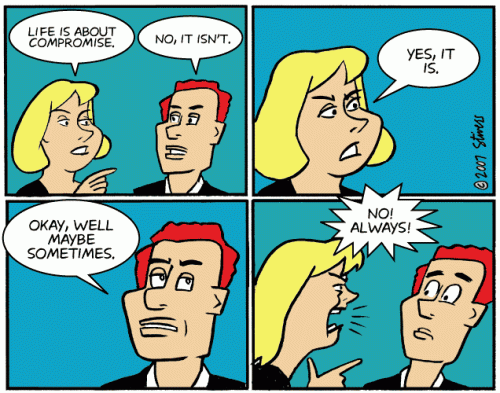I have used the word “dilemma” in earlier posts since superintendents, principals, teachers, and, yes, students face situations that call for difficult choices among conflicting values. So for this post, I delve into the two persistent dilemmas at the core of the work teachers and administrators do daily.
By dilemmas, I mean situations where you have to choose between two or more competing and prized values. The choice is often hard because in choosing you end up sacrificing something to gain a bit of satisfaction. That is the compromise that all of us construct to reduce the tension.
There are two core dilemmas that educators face in the classroom, school site, and district office that won’t go away. They are in the air we breathe, the water we drink: the multiple roles we have to perform daily and the personal/professional conflict.
Multiple Roles Dilemmas
Teachers, principals, and superintendents have to perform three different roles in their classrooms and offices.
Instructional role. For teachers, that is obvious. For principals and superintendents, the pressure on these administrators to assume responsibility for instructionally guiding teachers has grown dramatically in the past three decades.
Since the 1980s, mainstream thinking about principals has shifted markedly from managing school-site decisions to re-asserting the importance of being instructional leaders. Now, principals and superintendents are expected to help teachers in meeting state academic standards, aligning curriculum, textbooks, and tests to those state standards, evaluating teachers, and producing higher student test scores.
Managerial role. Principals and superintendents have always been hired to administer schools. Superintendents expect their principals to set priorities consistent with district goals, use data for decision making, plan and schedule work of the school, oversee the budget and many other managerial tasks—including punctual submission of reports to the central office. School boards also expect their superintendents to discharge the managerial role. Currently, efforts by reformers to call superintendents and principals CEOs elevates the managerial role. And teachers, well, controlling a crowd of students to pay attention to a lesson, complete classroom tasks, and parcel out help to individual students requires sharply acute administrative skills.
Political role. A century ago, progressive reformers divorced partisan politics from schooling. The norm of political neutrality held that superintendents, principals, and teachers hide their political party preferences.
So most principals, superintendents, and teachers have avoided partisan politics in the workplace but they do act politically within the school community and classrooms. For example, to advance their school agenda, principals and superintendents negotiate with parents, individual teachers, student groups, central office administrators, and even city officials. They figure out ways to build political coalitions for their schools at budget time or to put a positive spin on bad news during crises. Such politics aim to improve a school’s image, implement an innovation, or secure new resources. Most principals and superintendents see this as going about their daily business, not politics. But it is acting politically.
And, yes, teachers also act politically when they figure out which students in their classes are the leaders, which students need to be cajoled into compliance or helpfulness, which students can help advance the teacher’s goals. Astute teachers build a coalition of support among their students for reaching the goals the teacher has set for the class. Experienced teachers often carry out that political analysis the first few weeks of the school year. Teachers are also political in dealing with their principal and district office in helping or hindering their school site leader achieve school goals.
Dilemmas inevitably arise when educators come to see that they are stronger at some roles than others, prefer some roles over the other but realize that often times they have to perform roles that they are less strong at and hardly prefer doing. This is the persistent dilemma of multiple core roles.
Personal/Professional Bind
You value highly your work and you value highly your family and friends. Both are highly prized. But your time and energy are limited. So you have to calculate the trade-offs between doing more of one and less of the other. You have to make choices.
Teachers, principals, and superintendents map out options: Put in fewer hours at work and more time at home. Or the reverse. Take more vacations and give up thoughts of career advancement. These and other options, each with its particular trade-offs, become candidates for a compromise that includes both satisfaction and sacrifice. If nothing is done–another option–risks rise for hurting family and friends or the job.
This is not a problem that one neatly solves and moves on to the next one. It is a dilemma that won’t go away. It is literally built into daily routines. There is no tidy solution; it has to be managed because the compromises worked out may unravel and again, teachers, principals, and superintendents would face unattractive choices.
Keep in mind also that the personal/professional dilemma bind. The new teacher or principal who is single and is passionate about becoming a first-rate educator will come in early, go home late and think constantly about students and teachers. The job is her life. But once a partner and children enter her life, the personal/professional dilemma shifts and a new compromise between work and home has to be worked out. Compromises to dilemmas don’t stand still.
These two persistent dilemmas are at the core of the work teachers and administrators do daily.


You need to be a member of School Leadership 2.0 to add comments!
Join School Leadership 2.0